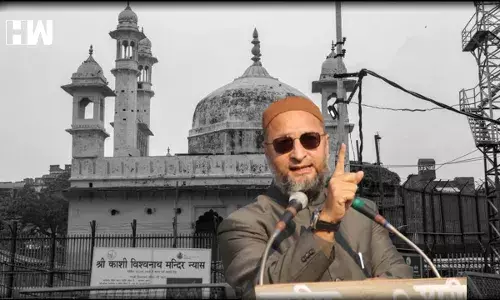In connection with a plea for access to a Hindu shrine behind it, court-appointed official and a team of lawyers carried out an inspection at a mosque in Varanasi yesterday.
Gyanvapi Mosque, which is located next to Varanasi’s Kashi Vishwanath temple, was surveyed and videographed yesterday. The process is expected to continue today.
After Friday prayers, the inspection of the mosque’s outer periphery was carried out. During the inspection by a court-appointed commissioner and a team of lawyers, heavy police force was on the ground.
The inspection was carried out after a local court issued orders on a petition filed by five women last year. Maa Shringar Gauri site, located at the back of the mosque’s western wall, is presently opened once a year for rituals and prayers. However, the petitioners have sought unrestricted, yearlong access to the site.
The petition filed by the five women has also sought permission to pray to other “visible and invisible deities within the old temple complex”. The authorities were directed by the local court to conduct inspection and videography of the site and submit a report by May 10.
The Gyanvapi mosque’s caretaker committee and its lawyers have said they are opposed to any videography inside the mosque. The court’s order, the caretakers say, has not allowed videography inside the mosque, but lawyers on the other side claim they have the court’s go ahead.
The Allahabad High Court, earlier in March, had dismissed a plea by the mosque’ caretakers, challenging the local court’s order to appoint an advocate as commissioner.
AIMIM Chief Asaduddin Owaisi, reacting to the court’s recent order, said it “is opening the path for the bloodshed of Rath Yatra and anti-Muslim violence of 1980s-1990s”.
Owaisi, condemning the Varanasi court’s order, said in a tweet, “This order to survey Kashi’s Gyanvapi Masjid* is open violation of 1991 Places of Worship Act, which prohibits conversion of religious places.”
“[The] SC [Supreme Court] in Ayodhya judgement had said the Act protects ‘secular features of Indian polity which is 1 of basic features of Constitution’,” Asaduddin Owaisi said.
As an independent media platform, we do not take advertisements from governments and corporate houses. It is you, our readers, who have supported us on our journey to do honest and unbiased journalism. Please contribute, so that we can continue to do the same in future.

